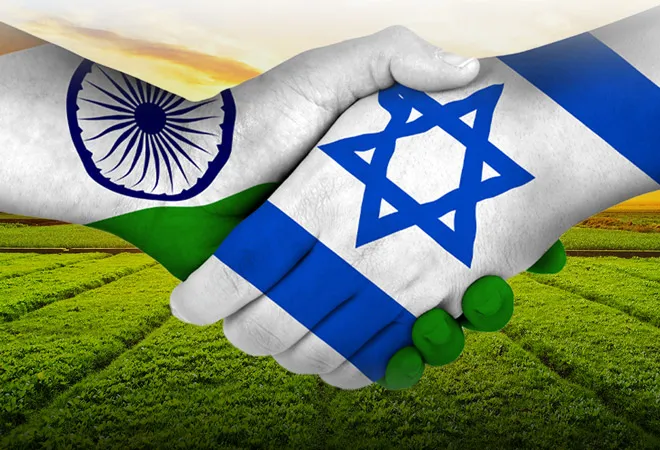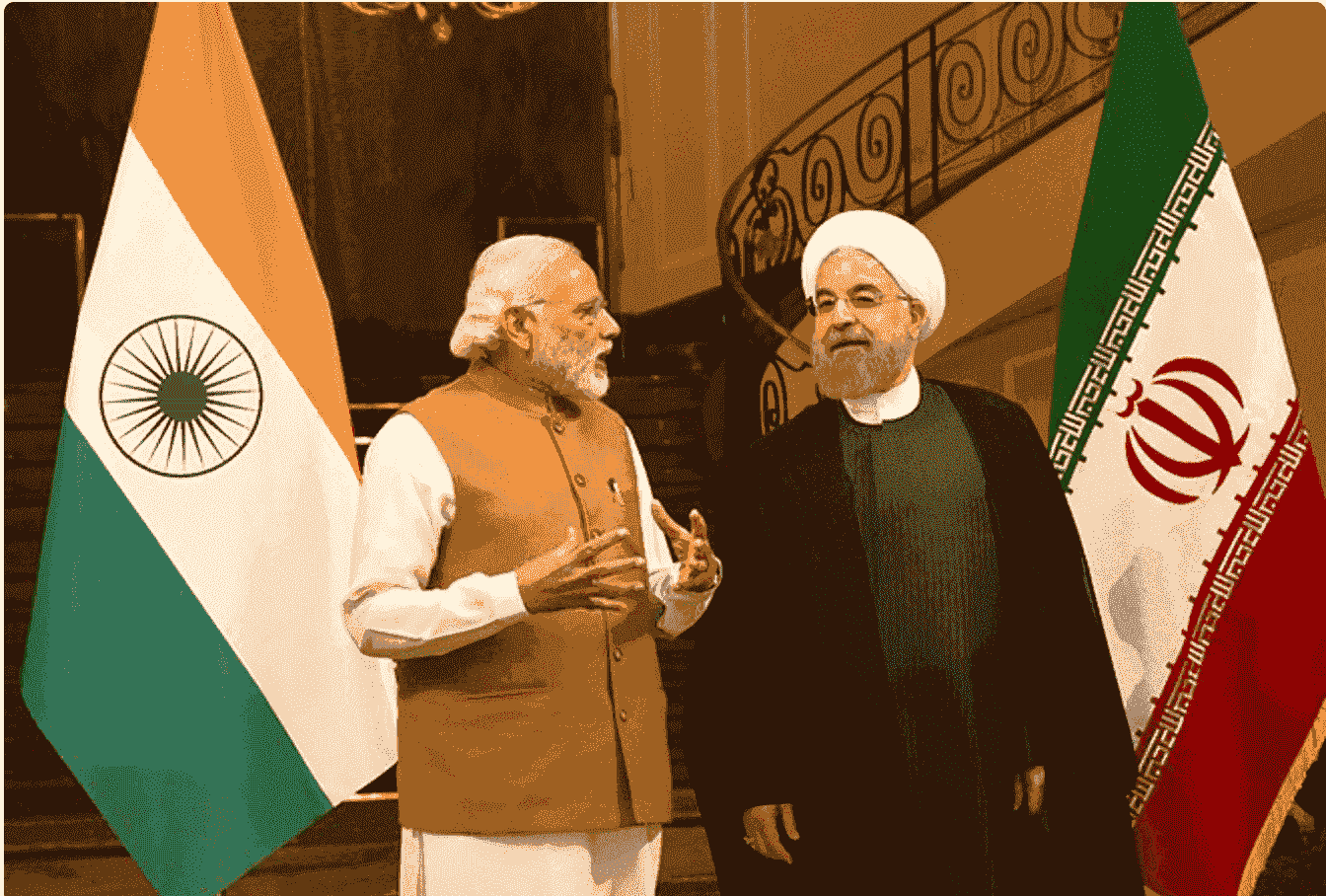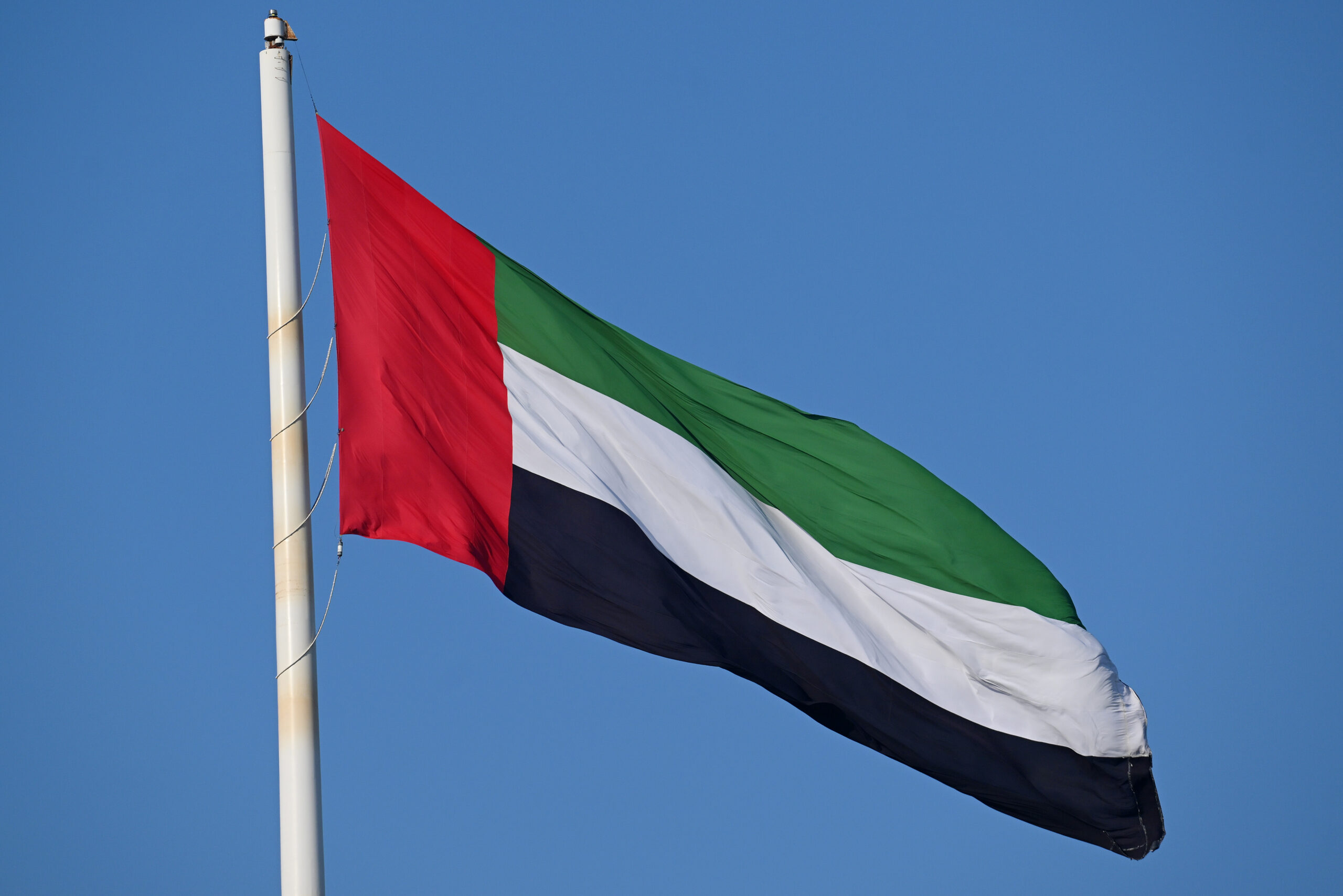Institutional collaborations and joint ventures between India and Israel can help address India’s water and food security challenges
As India celebrates 30 years of its diplomatic ties with Israel, it faces challenges affecting its agricultural development and productivity. Foreign assistance is crucial for India to overcome these challenges. Indo-Israel cooperation in critical technologies like Unmanned Aerial Vehicles and Water technologies can help India address its agronomic challenges. Agriculture, which accounts for 18.3 percent of India’s Gross domestic product (GDP), is its largest employment provider despite its declining contribution to the national economy. Around 70 percent of rural households depend on agriculture for their livelihood. The Economic Survey (2022-23) stated that despite a 3 percent growth in 2021-22, agriculture needs a reorientation as it faces climate risks, fragmented landholdings, low mechanisation levels, and rising cultivation costs. The graph below shows the decline in the annual growth of agricultural GVA (gross value added) from 4.1 percent in 2020-21 to
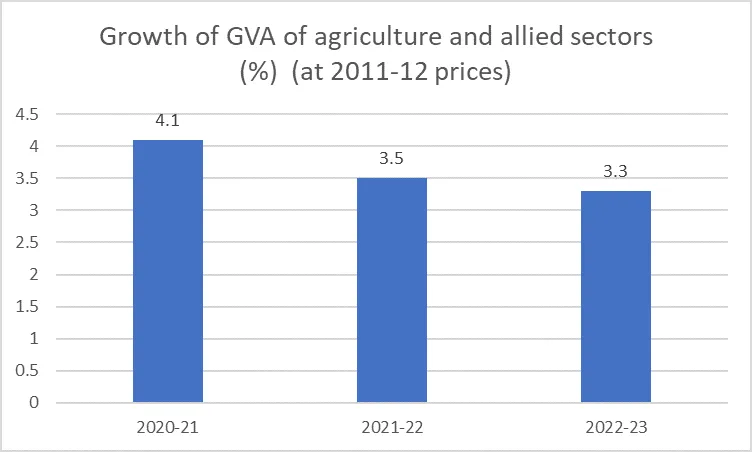
Source: Press Information Bureau, India Indian farms have been subject to locust attacks, and states like Haryana are presently facing labour shortages, resulting in farmers’ inability to grow or harvest their produce. Additionally, farmers are also facing declining rural incomes along with rising input costs.
Drone technology
Unmanned aerial vehicle (UAV) or drone technology has become more accessible and affordable in recent years. Their increasing long-range capability, endurance, and applications make them essential for civilian and military purposes. In agriculture, drones can provide services like spraying fertiliser on large farms and mapping agriculture plots.
Indo-Israel cooperation in critical technologies like Unmanned Aerial Vehicles and Water technologies can help India address its agronomic challenges.
In India, drones assess crop damage, spray pesticides and fertilisers, and tackle locust onslaughts. Depending on the purpose, mounting a drone with a spraying mechanism or sensors can help the entire crop cycle—from seeding to harvesting. An agricultural drone costs INR 3 lakh to INR 11.5 lakh, based on its water-holding capacity. India and Israel can work towards enabling the use of drone technology in Indian agriculture, as drones allow farmers to gather data by covering large areas of land quickly and efficiently. A pilot project by an Israeli company, Tevel, uses drones to perform time-consuming and labour-intensive tasks like plucking apples, which can be ideal for Indian farms experiencing labour shortages. In 2022, a Chennai-based drone startup, Garuda Aerospace, signed a memorandum of understanding (MoU) with Israel’s Elbit Systems to build the Skylark 3 drones for large-scale surveying and mapping of Indian villages under the Swamitva Scheme. Since Artificial Intelligence (AI) is the Indian drone ecosystem’s strong suit, India and Israel could leverage their expertise in designing sophisticated systems that use drones to minimise dependence on labour and fast-track processes. These systems apply to seed pod planting, where AI-run drones automatically shoot pods containing plant nutrients and seeds into prepared soil patches. With more sophisticated AI, drones can detect moisture deficits using thermal, multi-spectral or hyper-spectral sensors and irrigate only those areas with precision.
Their increasing long-range capability, endurance, and applications make them essential for civilian and military purposes.
Adding LiDAR (Light Detection and Ranging) sensors to AI-powered drones could enable farmers to estimate timber or sugarcane production. Indo-Israel research collaborations could focus on building AI-enabled software to perform faster soil analysis. This technology will create accurate 3D maps that can be used for planting, planning, irrigation, and estimating nitrogen levels, helping farmers plan adequate fertiliser inputs for optimal crop growth. A strengthened collaboration between the two countries in drone technologies would help India address the problem of low mechanisation levels in agriculture. Furthermore, it would empower farmers to make more informed production decisions leading to increased yield quantity with improved quality, minimising crop failures. While the affordability of drones for the average Indian farmer is questionable, the Indian government has been addressing it by offering subsidies for purchasing drones.
Water Technologies
A 2018 report by the NITI Aayog finds that 600 million people face high to extreme water stress. India’s increasingly erratic monsoon adds to this challenge. The problem gets compounded by the significant percentage of rural households that solely depends on agriculture for their livelihood. Since 2022, cereal prices in India have spiked and will likely remain elevated due to lower production from scanty rainfall. In February, cereal inflation peaked at 15 percent and 18 percent for urban and rural areas, respectively. India’s rain-fed agriculture is in dire need of the latest technologies that ensure adequate water supply to crops.
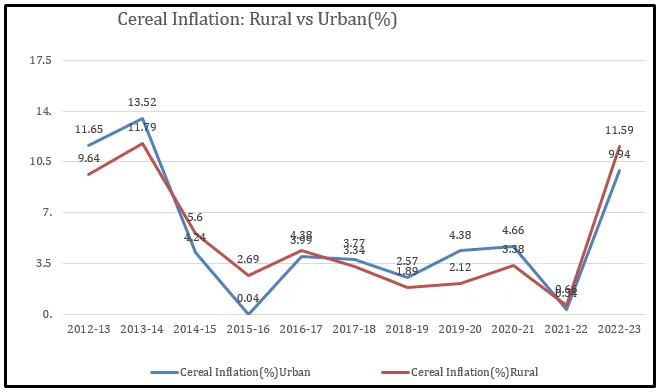
Source: CMIE Database
Strengthened cooperation with Israel under the 2016 ‘Water Resources Management and Development Cooperation’ MoU can address these water conservation and resource management challenges by building new water technologies and supply systems that transport water to arid regions. Indian companies and official delegations regularly visit the WATEC (Water Technology and Environment Control Conference) biannual event, which showcases Israel’s water and energy technologies. Jal Shakti Minister Gajendra Singh Shekhawat’s visit to Israel in 2019 further boosted this cooperation.
Indo-Israel research collaborations could focus on building AI-enabled software to perform faster soil analysis.
Israeli water companies have set up infrastructure projects in India to ensure water availability. In 2019, an Israeli drip irrigation company, Metzer Group, inaugurated a plant in Hyderabad as a joint venture with India’s Skipper Ltd. Shortages of power supply for pump sets and water for irrigation have caused Indian farmers to suffer crop losses on many occasions. In such a scenario, drip irrigation can play a transformative role, in cultivating high-value crops like bananas, sugarcane, cotton and paddy, especially for groundwater-dependent farmers facing frequent load-shedding. Higher agricultural productivity will boost rural incomes and reduce input costs. Israel’s IDE Technologies is building desalination plants in India, which play an instrumental role in addressing the issue of water scarcity in India’s rural coastal areas. IDE has built India’s largest desalination plant in Jamnagar, with a capacity of 160,000 cubic metres daily. These plants can address inter-state water disputes, especially in Southern India. However, capital-intensive desalination plants may not be viable in rural geographies. Here, atmospheric water generators (AWG) can be a cost-saving alternative by converting air humidity into drinking water. Israel’s Watergen and India’s SMV Jaipuria Group’s 2022 joint venture seeks to build water-from-air technologies over the next three years, with investments of over US$50 million, including a manufacturing plant.
While India’s drone industry has witnessed positive regulatory changes, it bears the high costs of lithium-ion and lithium-polymer batteries and the lack of domestic manufacturing capacity.
Joint ventures between Israeli and Indian companies in building water technologies can potentially address India’s water requirements for drinking and agriculture. Water cooperation can open new possibilities for India to develop its domestic manufacturing capabilities while addressing resource constraints.
The way forward
In May 2023, the Indian Institute of Technology (IIT) Madras signed a Letter of Intent (LoI) with Israel to build an ‘India-Israel Center of Water Technology’ for joint research in water resources management and technologies. It also aims to build human capacity to ensure the implementation of Israel’s best technologies suited for Indian requirements and pilot sustainable technologies to ensure India’s water security. While India’s drone industry has witnessed positive regulatory changes, it bears the high costs of lithium-ion and lithium-polymer batteries and the lack of domestic manufacturing capacity. India-Israel cooperation in training drone pilots and designing and manufacturing drones can address this mismatch between the supply and demand of talent in this space. The ban on drone imports has highlighted the need for component manufacturers in India. Drone adoption in agriculture can potentially create 100,000 job opportunities in three years. Institutional collaborations and joint ventures between India and Israel can benefit India’s youth by boosting employment opportunities. Indian youth will acquire better technical skills and know-how to develop innovative solutions to address India’s water and food security challenges.
Kanishk Shetty is an intern at the Observer Research Foundation
